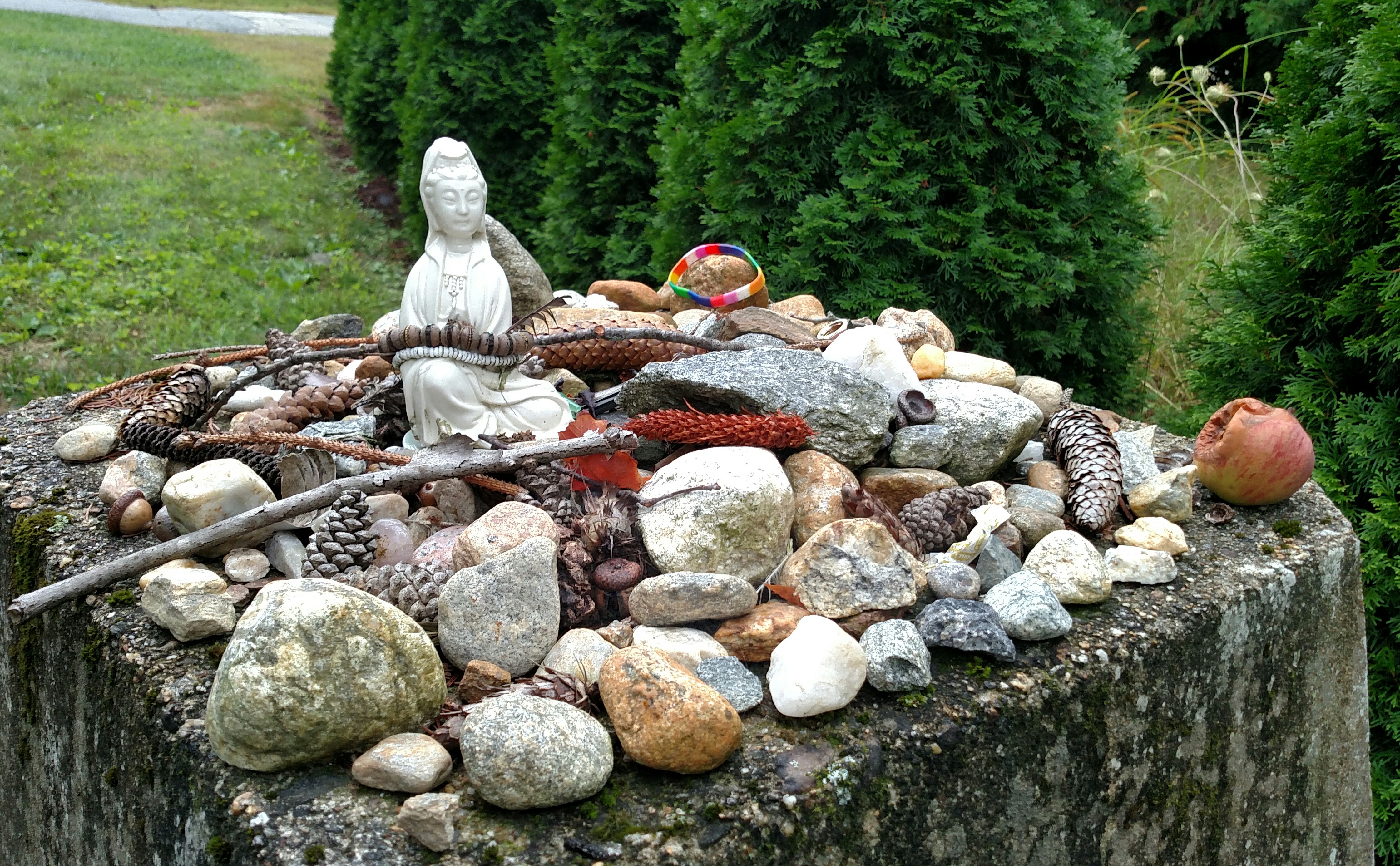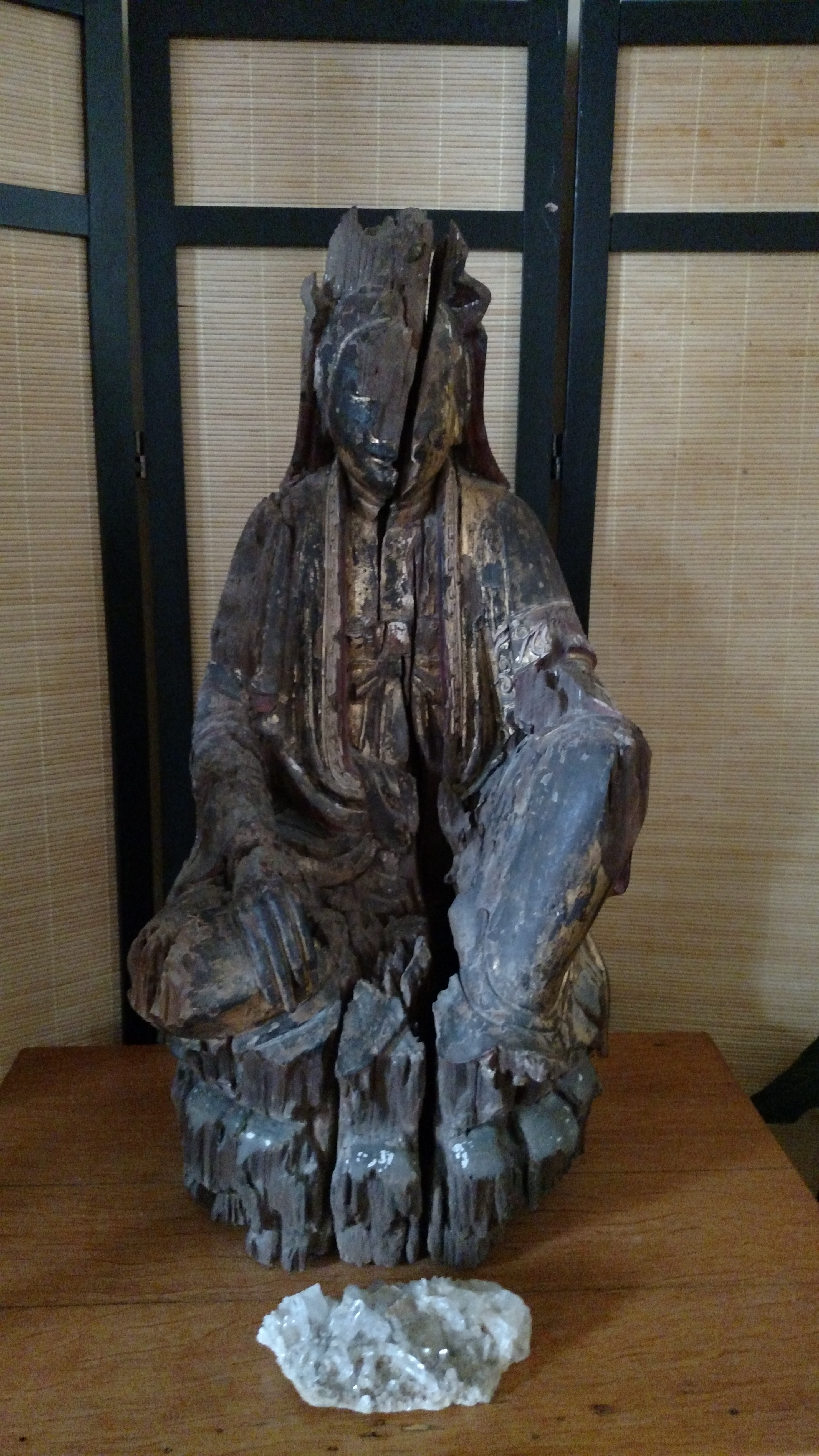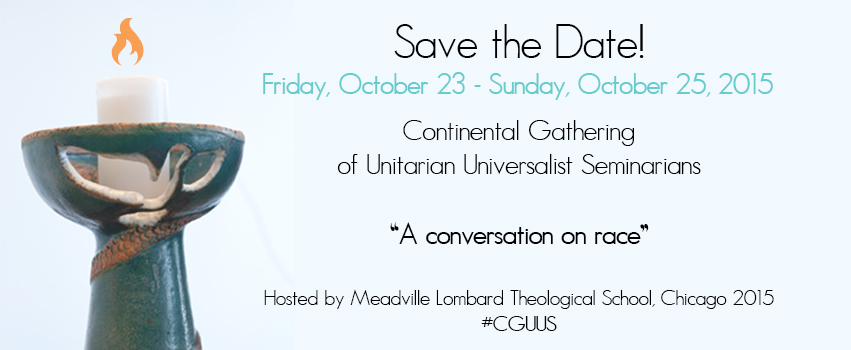I was looking for the missing brahmavihara.
 Walking around the beautiful grounds of the Insight Meditation Society (IMS) in Barre, Massachusetts, where I was spending three days in a self-directed silent retreat, I happened upon the many outdoor benches offered. All are simple, most are unadorned. But a few of them – three to be exact – have one of the brahmaviharas – super virtues – carved into them.
Walking around the beautiful grounds of the Insight Meditation Society (IMS) in Barre, Massachusetts, where I was spending three days in a self-directed silent retreat, I happened upon the many outdoor benches offered. All are simple, most are unadorned. But a few of them – three to be exact – have one of the brahmaviharas – super virtues – carved into them.
I first found uppekkha: equanimity.
Then I happened upon karuna: compassion.
I went looking and found metta: lovingkindness.
 And I kept looking, for there are four brahmaviharas, also known as the four abodes or four boundless states. But the fourth was nowhere to be found. As I was getting ready to leave IMS, my three days of focus and centering coming to an end, I asked the woman in the office where I might find the fourth. She didn’t know. She thought it possible that it had been damaged in one of the ice storms and turned into kindling. A chance to meditate on the impermanence of things, but not so much a chance to explore these super virtues.
And I kept looking, for there are four brahmaviharas, also known as the four abodes or four boundless states. But the fourth was nowhere to be found. As I was getting ready to leave IMS, my three days of focus and centering coming to an end, I asked the woman in the office where I might find the fourth. She didn’t know. She thought it possible that it had been damaged in one of the ice storms and turned into kindling. A chance to meditate on the impermanence of things, but not so much a chance to explore these super virtues.
I never did find mudita. At least, not on a bench at IMS.

No worries. I am used to looking for it, something I must do regularly, for it is not well taught in our competitive and individualistic society. Temperamentally, this is not my natural state. In some circumstances, the exact opposite of mudita arises within me: jealousy, self-interested competitive impulses, even the rather unspiritual state of Schadenfreude. It takes intention and effort, sometimes a mighty effort, to cultivate this quality within myself and to renew an authentic commitment to it.
Just what is mudita? Sympathetic Joy. Sharing in the joy of others – their accomplishments, their good fortune, their well-being, their existence. Sharing not just in the joy of those close to us, but in others. ALL others. Even the guy who just cut you off in traffic and made it through the light, while you are waiting at the longest. red. traffic. light. ever. It is moving away from any sense that the happiness of others might in some way threaten or impinge upon one’s own happiness or success. That, my friends, is not what they taught me in high school.
 Tomorrow I head to Chicago to attend the third Continental Gathering of Unitarian Universalist Seminarians (CGUUS) – this year, around 40 seminarians will come together to network, converse, and learn together. It was at the first CGUUS, held in Boston in 2013, that I experienced powerful examples of mudita that have stayed with me since and planted seeds I expect to grow and re-seed throughout my ministry.
Tomorrow I head to Chicago to attend the third Continental Gathering of Unitarian Universalist Seminarians (CGUUS) – this year, around 40 seminarians will come together to network, converse, and learn together. It was at the first CGUUS, held in Boston in 2013, that I experienced powerful examples of mudita that have stayed with me since and planted seeds I expect to grow and re-seed throughout my ministry.
Before I took part as a member of the planning crew for that first CGUUS two years ago, or came together with the approximately 50 people who came together that autumn weekend, I knew that one is supposed to be happy for others. I wasn’t raised in the wild. I had manners.
Yet, I found I was sometimes often more than I care to admit feeling competitive towards and threatened by my peers, sure that someone else’s achievement or victory would diminish my own. I mean, weren’t we all competing, more or less, for the same, finite jobs? I was definitely missing mudita as a spiritual guide!
The covenantal relationship required of us in professional ministry is some deep and serious sh*t. When we become Candidates for the Unitarian Universalist Ministry, as well as once we receive either preliminary or final fellowship, we are expected to live by the following covenant:
United in our call to serve the spirit of love and justice through the vocation of ministry in the liberal religious tradition, we, the members of the Unitarian Universalist Ministers Association, covenant with one another:
- To conduct ourselves with integrity, honoring the trust placed in us;
- To embody in our lives the values that we proclaim on behalf of our faith;
- To support one another in collegial respect and care, understanding and honoring the diversity within our association;
- To hold ourselves accountable to each other for the competent exercise of our vocation;
- To use our power constructively and with intention, mindful of our potential unconsciously to perpetuate systems of oppression;
- To seek justice and right relations according to our evolving collective wisdom, and to refrain from all abuse or exploitation;
- To cultivate practices of deepening awareness, understanding, humility, and commitment to our ideals;
- To labor earnestly together for the well being of our communities and the progress of Unitarian Universalism.
Through fidelity to this covenant and our Code of Professional Conduct, we aspire to grow in wholeness, and bring hope and healing to the world.
Taking on this covenant, coupled with coming into real relationship with my peers and colleagues – both in person and virtually — deep relationship, knowing their stories, their gifts and their challenges, accepting their feedback (the gentle and the painful) has multiplied my capacity for mudita. It comes now with more ease, like a seed that was planted and later takes root and grow. Like Nyanaponika Thera writes:
the seed of mudita can grow into a strong plant which will blossom forth and find fruition in many other virtues, as a kind of beneficial “chain reaction”: magnanimity, tolerance, generosity (of both heart and purse), friendliness, and compassion. When unselfish joy grows, many noxious weeds in the human heart will die a natural death (or will, at least, shrink): jealousy and envy, ill will in various degrees and manifestations, cold-heartedness, miserliness (also in one’s concern for others), and so forth. Unselfish joy can, indeed, act as a powerful agent in releasing dormant forces of the Good in the human heart.
With practice, it has sometimes come as my first reaction (though I will fess up: not always, but I can laugh at myself when I see jealousy or competition rising within me). It seems to me that the practice of mudita is a way to live the affirmation of the interdependent web of all existence, to live into the truth (not the belief, not the thought) that there is No Separation. Because if your happiness is a source of my happiness, your success is a source of my joy, then we are bound to one another in deep ways. What is it the great Buddhist teacher, Thich Nhat Hahn, has said about our purpose here?
We are here to awaken from the illusion of our separateness.
Mudita affirms and grows our natural bent towards mutual aid and co-operative action. It is the very renunciation of competition, of aggression, of jealousy and envy – all of which are also natural and exist within us, yet are skillfully left to their own impermanence, rather than unskillful means of practicing them until they become ruts in our brains and tendencies in our habits.
With my Unitarian Universalist eyes, I see mudita as a relational, covenantal version of humility: I am not the center of the universe not only because I am in relationship with you, but because I experience joy centered not on my fortunes, but on yours. It reminds me of the Lynn Ungar poem, “Boundaries:”
The universe does not
revolve around you.
The stars and planets spinning
through the ballroom of space
dance with one another
quite outside of your small life.
You cannot hold gravity
or seasons; even air and water
inevitably evade your grasp.
Why not, then, let go?You could move through time
like a shark through water,
neither restless nor ceasing,
absorbed in and absorbing
the native element.
Why pretend you can do otherwise?
The world comes in at every pore,
mixes in your blood before
breath releases you into
the world again. Did you think
the fragile boundary of your skin
could build a wall?Listen. Every molecule is humming
its particular pitch.
Of course you are a symphony.
Whose tune do you think
the planets are singing
as they dance?
Why not, then, feel mudita? Or at least try. At least fake it ‘til I make it — to borrow wisdom from the Twelve Step movement. Why not feel sympathetic joy for those around you? Why not sing a symphony of unselfish joy, knowing that taking joy others’ happiness enriches your own?
Maybe, just maybe, you’ll find something you don’t even know you are missing.



Thank you! The Lynn Ungar poem reminds me of last Sunday’s hymn (I was away, but sang it all weekend long on the Vineyard). http://www.languageisavirus.com/may-sarton/read_invocation.php#.Vijfun6rSUk
Beth Murray here, from the Church of the Larger Fellowship, an online and by mail Unitarian Universalist congregation. We are interested in publishing Karen G. Johnston’s blog, “Missing Mudita” in our July-August worship publication. The theme for that month is Joy. Please email me, and I can give you additional details:
Beth Murray
bmurray@clfuu.org
617-948-6150